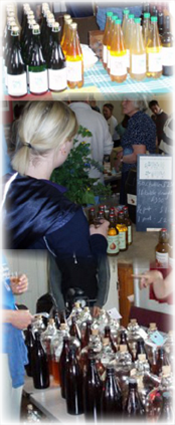So I have started selling. Anything else?
i. Record keeping
It is always a good idea (if not required for the tax man) to keep a track of your cider - the more detailed the better. This also helps to prove the genealogy of your cider, and some cider makers keep records from tree to bottle, including the orchard that apples were from.
You will also need to maintain records of quantity made, batch information, cleaning records, any losses or quantities used for personal consumption and accounting information (sales, profits etc.). This is not just for Customs and the Revenue (even though they are one and the same these days). Should you have a customer fall ill, you may be required to trace batches to find the source.
We cannot hope to make this an absolute list, but merely make you aware of the sorts of things you should keep records of when in business. Generally, good business practice will see you through. For a link to those who can help you to run a business properly, see below:
ii. Membership of Associations
This is something that some craft producers choose to do even if they are not currently selling, although clearly it is a cost. However, there are benefits of joining an industry body, such as the NACM (National Association of Cider Makers) or one of the regional bodies associated with them, or CAMRA, who run 'Apple' for cider makers.
As with all things, it is worth doing your homework before signing up - why not take some advice from within the Cider Workshop group?
For further information, follow the links within the 'links' section of this website.

| Quick Links: |
We are always after help and guidance in order to make the commercial side of cider making easier for those who want to start out. If you have any experiences you wish to share with us, join the group and contact the administrator (or just post your experiences!) |

